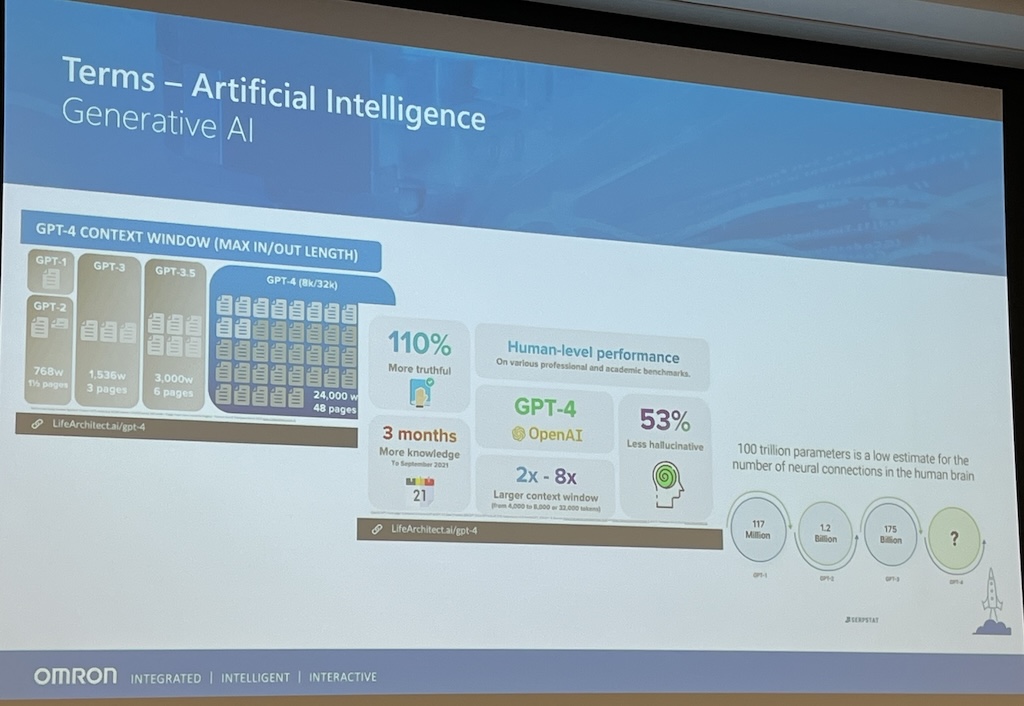Artificial intelligence (AI) is evolving and has some wondering what the status of their job is, but the answer to that question is a more personal one.

Artificial intelligence (AI) insights
- Artificial intelligence’s (AI’s) evolution blurs the line between human creation and machine generation, pushing us to redefine what makes us uniquely human.
- Embracing AI’s rise requires individuals to identify their unique value, adapt and leverage skills in a changing technological landscape.
Artificial intelligence (AI) has exploded in the public consciousness in the last year with ChatGPT and other large language model (LLM) systems showing how lifelike, in some cases, they can be. This has prompted many discussions, particularly as they get smarter and more sophisticated, about what this means for the future of work.
Paul Anderson, director of field application engineering for Omron, addressed some of these concerns in the keynote presentation, “Is AI Coming for My Job?” at Omron Open 2023 in Hoffman Estates, Ill.
Is AI coming for people’s jobs? It’s not quite so clear-cut and is one that has been going for a long time, according to Anderson. Even before AI, there has been this question, most notably with industrial and collaborative robots.
The cycle of science, technology and society working hand in hand has been going on since the dawn of time. Based on the SINIC theory, science makes a discovery, it is applied technologically and then brought to society, which adjusts and makes changes. Questions come up that society doesn’t have the answers for, which prompts more questions and advances.

“Instead of working together, we’re using machines to enhance what humans are doing,” Anderson said. How do we use machines to improve what we do as individuals.”
The relationship between humans and machines working together isn’t new, but what has changed is how generative AI is moving into the realm of what makes people human, which is creation. Anderson admitted this is where things get a little creepy because it’s blurring the lines between the two realms in a way that might have seemed like science fiction even a decade ago. Movies like “Ex Machina” don’t seem so crazy.
Generative AI has been around in some form already because the concept is about probabilistic extrapolation and learning from what has been done before. Anyone who has texted and has seen the system predict what will be said next has already dealt with generative AI on that basis. The AI learns based on people’s thought patterns and speech and adapts accordingly. What’s being done with systems such as ChatGPT is on a much larger scale, but the fundamental principles remain the same.
With ChatGPT and other LLMs, they’re widening parameters to the point where it will soon reach the capability of the human brain. GPT-3 has 175 billion parameters and it’s expected GPT-4 will be in the low trillions. The human brain, Anderson said, has 100 trillion parameters, and that’s being conservative.

“We’re getting to the point where the ability of these systems is really large and none of us can understand this,” he said. “You can’t explain billions of parameters. It’s unknowable.”
Four way to prepare for AI and find your value
AI is moving forward in ways that might not have seemed possible a year ago and it’s only going to advance. Technology has always marched forward and will continue to do so. There’s no point in going backwards. The industrial revolution started in the late 18th Century has continued on and people will adapt and evolve. The same principles that were true then are true now.
The key, Anderson said, is asking what your value is. “Different people can do the same job,” he said. “But what is your unique value and ability you bring? That’s what customers and employers are looking for.”
AI is coming, but there are four ways people can prepare for the future.
-
Be a student.
-
Data. Data. Data.
-
Think bigger.
-
Leverage your value.
Anderson said, “If you’re committed to knowing your value and willing to push forward, you will thrive.”
Chris Vavra, web content manager, CFE Media and Technology, [email protected].



